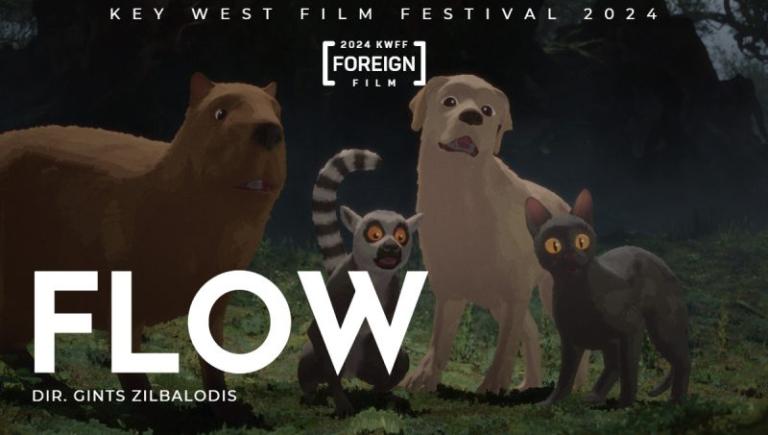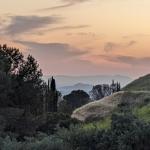Sundays Jan & I try to schedule a date night. We don’t pull it off quite as frequently as we wish But this Sunday we did. It featured a drive to Glendale and the Laemmle to see Flow and then dinner.
I’ll cut to the chase. Rotten Tomato’s professional reviewers give Flow a 97% score, while their amateur reviewers give it 94%. No argument here. Jan & I both loved it.
The film is animated. A Latvian production, written and directed by thirty-year-old Gints Zilbalodis. This is his second feature film. As there is no dialogue there’s no need for translation. The film was made with a free open-source software tool Blender, which has attracted praise and complaint from writers around the interwebs. Me, I found the images haunting and beautiful.
The film especially captures animal movement. Each animal moves like it is supposed to and beautifully.
It’s set in a lush forest. The plot involves several animals, but it follows mostly from the perspective of a black cat. Humans have disappeared. Although they leave evidences of their prior presence throughout the film.
The cat may have once been a pet. At least it nests in an unmade bed in a house that it returns to after wandering, hunting, and avoiding being prey itself in the surrounding forest. There are sculptures I take to be of the cat in and all around the house, including an unfinished carved wooden one in the house implying an abrupt leaving on the part of the human occupant. There is also a monumental sculpture outside, presumably cut away from a small mountain.
It is gorgeous and from the beginning we get a sense of how it can be dangerous.
Then the turning moment. A flood comes, a mad torrent, washing everything away in its wake.
And then it rises and rises.
The plot, I think it’s fair to call it a plot, follows the cat as it escapes into a boat occupied by a capybara which more than anything wants to nap. Eventually a small band of creatures are gathered together including the cat, the capybara, a ring-tailed lemur, a blond labrador, and a great secretary bird.
The animation perfectly captures the movements of each thing involved water and creature. Eventually there are human traits added in to the animals. Not heavily, but it is present and noticeable. They discover the use of the boat’s rudder, and the secretary bird especially seems adept at its use. But they don’t figure out the use of the sail.
The most human of the parts of the film is how these wildly different creatures gradually come together as a sort of unlikely family.
The general consensus is that Flow is some form of ecological fable. And I see how that could be so. Probably ecology and catastrophe are joined somewhere in Zilbalodis’ heart as he wrote the script.
But it is very much also a screen upon which we can write our own stories. Although I’m sure its easer to find some narratives than others.
The whole thing itself is in motion, and there is catastrophe, and struggle, and friendship, and, maybe even that meditation on family.
There’s another character, or it seems one. A gigantic whale sized fish. It might not even be a fish, but a whalelike creature as it seems to have a mammalian eye. It brings its own invitations to our mental scripting, slowly unfolding.
What I found in Flow was a pilgrim’s tale. A path through change and catastrophe. A path without a promise of a happy fairy tale like ending. Although Flow certainly offers that option, if we want to take it.
My takeaway of Flow was as a Buddhist parable. Of, well, flow. The play of causes and conditions like a great river flowing in its mysterious rhythms. With subtle hints of eternal return.
What a wonder the world is when we don’t insist on a particular conclusion, or even survival. Wanting permanence is a great trap in the Buddhist telling of things, of the way things are.
And Flow shows what that might look like when we enter the mystery and allow it take us where it will.
A lovely meditation.
Jan & I both highly recommend it.















